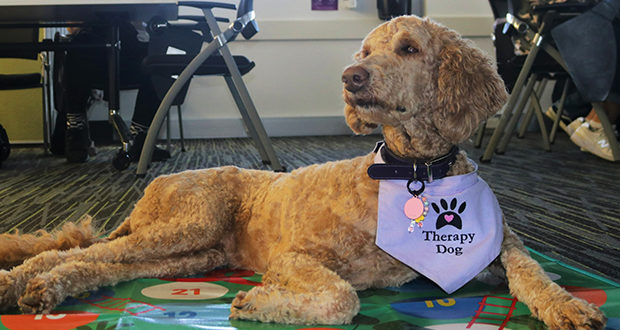New research suggests dogs could be the solution to reduce university stress and boost staff and student mental health, while increasing their motivation, engagement and overall wellbeing.
The University of Queensland is looking at the effect of animal-assisted education on tertiary students to determine whether having therapy dogs in lectures and tutorials would benefit their mental health.
Animal-assisted education has been incorporated into primary and high schools for a number of years, lead researcher from UQ’s School of Health and Rehabilitation Sciences Jess Hill said, but the research is lacking when it comes to the higher education sector.
“There are a lot of additional stresses that do come with starting university studies, and research has shown that it does have a negative impact on students' overall mental wellbeing,” Hill told Campus Review.
“We've only just started preliminary analysis, but it is suggesting that dogs have a positive impact on student wellbeing.”
Hill is accompanied by Elsa, a six-year-old Labradoodle who has been working as a therapy dog with the lecturer for the past five years, first in a paediatric clinic before moving on to academia.
In her classes, Elsa assists Hill in her animal-assisted therapy demonstrations and interacts with students who give her pats, cuddles and treats.
Students can also play with her and her toys while she wanders around and sits with them during tutorials and lectures.
“I'm often hearing students say she's the reason they come to class, or will be giving her a cuddle during a stressful period, and they often say things like, 'Oh, thanks, Elsa, I really needed that today'.
“That interaction with her in the classroom is already beneficial.”
While universities across Australia provide students with counselling and support, Hill said research shows students are often resistant to reach out for the services that universities offer.
She believes Elsa could actually bridge that gap and help support students' wellbeing.
Pre-pandemic, university students were five times more likely to develop poor mental health – a number which has increased as students reported extremely high levels of distress during Covid-19.
Poor mental health in academia is often due to the transitions students have to go through while starting university, such as moving away from home, having to work part-time and managing their timetable.
Prolonged stress can lead to poorer academic results and higher withdrawal rates.
“What the current research indicates is that the presence of an animal does assist to reduce those stress levels, as well as increase engagement and motivation,” Hill said.
While Hill teaches about animal-assisted therapy, she believes all students or staff could benefit from having a dog around.
Elsa, who doesn’t work specifically with university staff, often accompanies Hill to her office and during meetings and other events where she interacts with other academics and gives them support.
“I often will have colleagues come into my office to interact with her when they want; anecdotally they are very happy when they see her walking through the halls.”
“It is something that's happened more incidentally, just because she's with me, but it could definitely be a line of research to look into in the future.”
Currently, many university staff and researchers across Australia have demonstrated high levels of stress which have been flagged by unions.
While being hesitant to suggest it as a solution (as her study results haven’t come through yet), Hill believes the inclusion of dogs in universities could help staff and students manage their stress.
“We are waiting to see what the results say at the end, but if they are positive I'd certainly like to see more animal-assisted therapy programs implemented at university.
“The next step in our research would be looking at how dogs could be implemented on a larger scale, but we'd also need to be looking at the impact on the welfare of the animal.”
According to Hill, before implementing therapy dogs in university settings at a larger scale, researchers need to ensure that dogs will be enjoying their work and that it won’t impact their own welfare.
While the lecturer believes that dogs crossed with poodles like Elsa have the advantage of being hypoallergenic and avoid allergies, the dog’s personality is the most important factor, she said.
Dogs in the higher education sector will interact with a large number of different people, Hill said, and it is important that the dog is motivated and wants to engage.
“Elsa loved her clinic work, but I feel as though she was born to be an academic therapy dog.
“She loves working with the students, and she'll even try and pop her head into classes that aren't hers whilst we're waiting for rooms.
“She's definitely found her calling,” Hill said.
Do you have an idea for a story?Email [email protected]
 Campus Review The latest in higher education news
Campus Review The latest in higher education news

